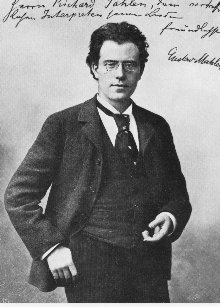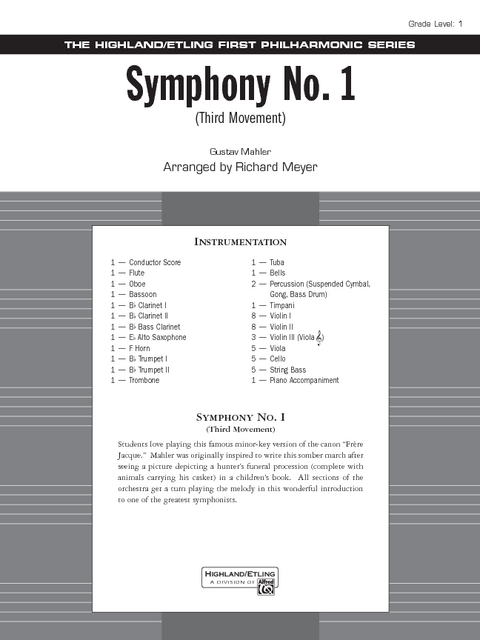Symphony no. 1 (3rd movement)
Buy this item (in stock)
Product ID: HE1 FP19584
By Gustav Mahler
Publisher:
Highland Etling
Arranger:
Meyer
Series:
First Philharmonic
Line Up:
Symphony Orchestra
Duration:
6:
Level: 1
Set & Score
This item is in stock
About this item
Students love playing this famous minor-key version of the canon "Frère Jacque." Mahler was originally inspired to write this somber march after seeing a picture depicting a hunter's funeral procession (complete with animals carrying his casket) in a children's book. All sections of the orchestra get a turn playing the melody in this wonderful introduction to one of the greatest symphonists.
Instrumentation
1x Conductor score
1x Flute
1x Oboe
1x Clarinet Bb 1
1x Clarinet Bb 2
1x Bass Clarinet Bb
1x Alto Sax Eb
1x Bassoon
1x Horn F
1x Trumpet 1 Bb
1x Trumpet 2 Bb
1x Trombone
1x Tuba
1x Mallet Percussion
3x Percussion
1x Timpani
8x Violin 1
8x Violin 2
3x Violin 3 (Viola TC)
5x Viola
3x Violoncello
3x String Bass
1x Piano Accompaniment ad lib.
Reviews and rating
No review available, be the first to write one!

Composer
Gustav Mahler (1860-1911)

Gustav Mahler; 7 July 1860 – 18 May 1911) was a late-Romantic Austrian composer and one of the leading conductors of his generation. He was born in the village of Kalischt, Bohemia, in what was then Austria-Hungary. Kaliště u Humpolce is now in the Czech Republic. Then his family had moved not far to Jihlava where Mahler grew up.
As a composer, he acted as a bridge between the 19th century Austro-German tradition and the modernism of the early 20th century. While in his lifetime his status as a conductor was established beyond question, his own music gained wide popularity only after periods of relative neglect which included a ban on its performance in much of Europe during the Nazi era. After 1945 the music was discovered and championed by a new generation of listeners; Mahler then became one of the most frequently performed and recorded of all composers, a position he has sustained into the 21st century.
More info about the composer...



 Click above to view samples
Click above to view samples
